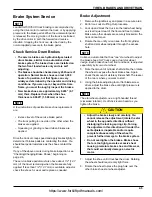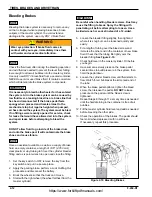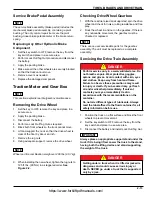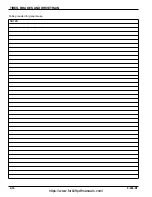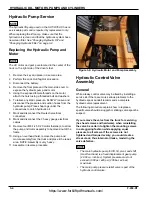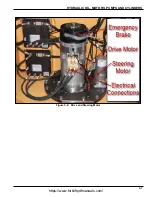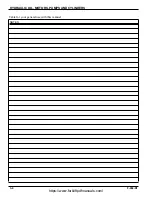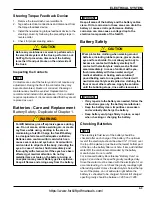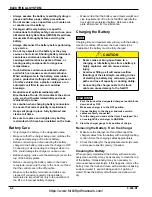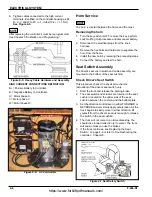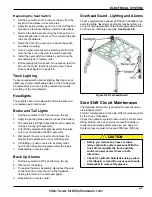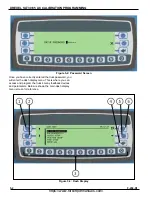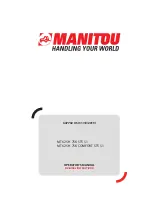
HYDRAULIC OIL, MOTORS, PUMPS AND CYLINDERS
3-3
Figure 3-2: Hydraulic Filter Housing Access
Checking and Adjusting
Hydraulic Pressure
WARNING
NOTE
For ease of checking hydraulic pressure, Landoll offers a
Pressure Check Kit (P.N. 0018152) which includes a
5000 psi (344.7 bar) gauge, hose and a quick-coupler
assembly. If you are using your own system, have shop
rags, oil absorbent and a small container ready to
manage oil spills.
1.
For this test, make sure that the hydraulic tank has
plenty of oil.
2.
Set the key to OFF, remove the key from the key
switch.
3.
Remove the control valve cover, located to the right
of the driver’s seat.
4.
Connect the pressure check kit quick-coupler (female
end) to the coupler (male end) on the control valve.
See Figure 3-3.
• Allow a few minutes time before disconnecting any
hydraulic fittings or hose assemblies to relieve the
system pressure to zero psi.
• If you are not using the pressure check kit, remove
the quick-coupler and install an appropriate fitting to
accept your pressure gauge arrangement.
• Have rags handy to manage oil leakage.
• Install your 5000 psi (344.7 bar) gauge arrangement.
• All parts connected to the gauge port must be
capable of handling up to 5000 psi (344.7 bar).
• To adjust pressure, the truck (pump) must be running
to create hydraulic pressure. Always pay careful
attention when servicing, while the truck is running.
To check or set the pressure, you must pull the tilt
lever to dead head (bottomed out) allowing the
cylinder to build pressure, then set the relief valve.
5.
Loosen the relief valve jam nut.
6.
Start the truck.
7.
Adjust the valve stem by turning clockwise to
increase pressure, counterclockwise to decrease
pressure. This procedure adjusts the pressure relief
valve setting.
8.
Release the joystick immediately once the pressure
is set at 3000 psi (206 bar).
IMPORTANT
Do not hold a hydraulic joystick (bottomed out) for
excessive periods of time. Extreme pressure is
applied to the system which can, over periods of
time, generate heat and damage oil and internal
components.
9.
If the pressure is low and cannot be adjusted to the
proper value, check the pump and make sure there
are no leaks in the hydraulic system. If the pressure
is too high and cannot be adjusted to the proper
pressure, replace the relief valve.
10. Tighten the relief valve lock nut.
11. Set the key to OFF, remove the key from the key
switch and disconnect the battery.
12. Remove the pressure gauge quick coupler or remove
your gauge arrangement.
13. Start the truck.
14. Lift and lower the mast a few times to check for leaks.
15. Set the key to OFF and disconnect the battery.
16. Reassemble all covers and panels.
Figure 3-3: Hydraulic Valve
HIGH PRESSURE FLUIDS CAN BE DANGEROUS!
Before continuing with this section, read about
the warnings of pressurized hydraulic oil under
“Hydraulic System” Warning page 1-4.
https://www.forkliftpdfmanuals.com/

